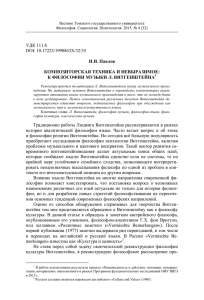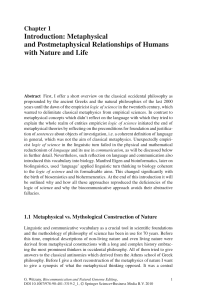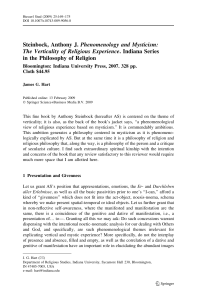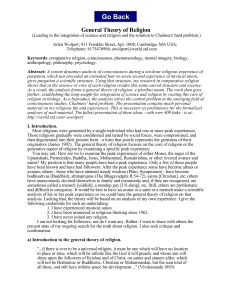Sound, object, projection: Wittgenstein and understanding music
реклама
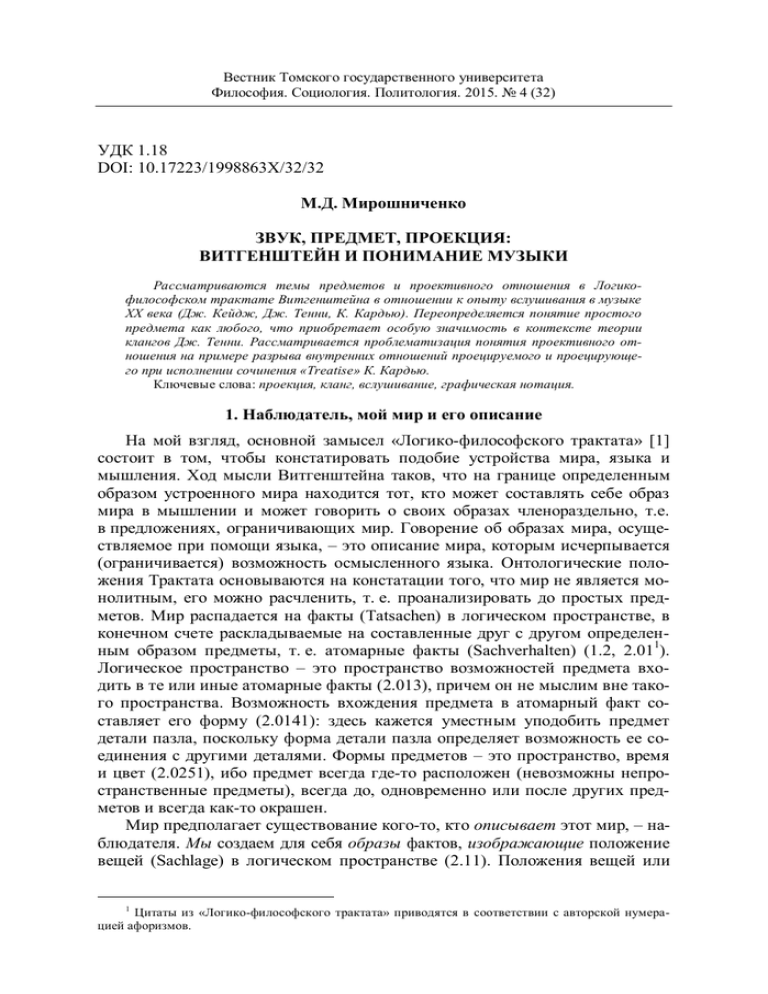
. . . 2015. 4 (32) 1.18 DOI: 10.17223/1998863 /32/32 . , , : - ( . , . , . ). , . . «Treatise» . , , : 1. . , . , , « » [1] , , . , , , , . . - , ,– , ) . - , , , . . (Tatsachen) . , (Sachverhalten) (1.2, 2.011). - , . . – (2.013), . (2.0141): , . – (2.0251), , ( ), - , . , . (Sachlage) 1 « . ,– - , (2.11). » - , , : 299 , . , , , , (2.13, 2.131, 2.14, 2.141, 2.15). – . , , , - , , , . , ; , (2.1513, 2.1514, 2.1515). , – . , , – , . (2.18, 2.2). , - (3). , . , , - , . – (3.4, 3.411). , « , » (4.032). – , , . , - (3.2, 3.201, 3.202, 3.203, 3.22). , – , – . , - , . , , : , ) , . , . . , . , , , , , . . – (4.26), . , , , (5.5561). , - . 300 – , , – , , . 5.62 , , , 5.63, : , ». - ) ( )». ? , , . , . [2], , . , . , , [3]. . , « »– - . , . , , . , - ; , , . 2.02 :« - ». , (2.013, 2.021). , . , , , , . , « , (wholism)», :« , Welt, , (iterable) , » » [3. P. 52]. « , » , – « , , : « », « » . . », - , , – : . , « - »: , , , , , . - , , : 301 « », , : « », , - , ? , , , , n . , , , . , , - , , . , : , - ; : (1) ( ); (2) , ). ( , « »: , , ,– « ; , », , , , – . . :« , . , .( « , , », .) , , ] - [ , , , , » [4. P. 10]. 2. 1929 . « « », « , » [5] , - , » [5. . 324]. - . 302 , , , , , . . , , , , . , , . – , (4.26). - , . , - , . , 1929 . . « - » . ( ) , - . ( , ) . :« , , , , . . .» (2.0131). , « ( - , – ) » , . . . , « - , , » [6. . 85]. “ ” “ , ”– ”, “ ”, « “ » [6. », . 90]. , : , , - « , , , » [6. . 91]. – , « , » [6. . 92]. , , ». - « - , , , : ( 2.0232 « ), 303 » : , , . - , , . », , . : , , , , , , . . ( », - , ; , , , , , . . « » . , ) , . , . , , , , 3.141, 4.011, 4.014, 4.0141 . , , , , ,– , : «4.014. , , , – , - . . , . . 4.0141. , , , – – ,– , , . , . ». , . , – . , , , . , . , , , - , (2.012), . ; , , - . 304 – , - . , . « » , 1929 . :« . »( , . : [7]). , - , , . – , . , , – , . - :« ; , , . ... - , » [8. P. 81–82]. « ». - , , , ( ) - , , « , » - . 3. , , « » « , »: , , . - , ? , . , ? (1934 2006) 1961 «META + HODOS: » [9]. , . « » - . . ” , “ : « ”... “ ”, “ – – , , : 305 » [9. P. 23]; « – - – , , » [9. P. 24]. – , . - , : – , , - , . , , - . , « » : , ( . , . . ; - ) « » , . ) « , ». , , « , . , - , , , - , » [10. P. 587]. 4. «Tractatus» «Treatise»: . - . (1936–1981) 1963–1967 . 193- «Treatise», , , , - . 1974 . « » [11] « » :« (1963) . [ , ] :“ ”, “ , ” <...> » [11. P. 127]. . 306 :« , - : ( , , ), ( , , , , , - .). , , , : ( - , .) » [11. P. 86]. , » , , , , , , , . , 4.014 4.0141 : ? ? , , , , , « »; . - . , , - - , , « , , » ; , , « . , » , - , . , . :« , . - . , . , , - , – , . - , » [12. P. 31]. : ) – ( , ; , 1. . . - . .: + « », 2011. , , : 307 2. . / . . . . .: + », 2013. 3. McCarty D. Ch. The Philosophy of Logical Wholism. Synthese. Vol. 87, No. 1. Wittgenstein, Part I (Apr., 1991). . 51–123. 4. Cage J. Experimental music // Cage J. Silence: Lectures and Writings by John Cage. Wasleyan University Press, 1973. . 7–12. 5. . (1929) // . 1914–1916 / . . . . .: + « », 2009. . 321–330. 6. . / . . . . , . . .: ; , 1999. 7. No R.A. Wittgenstein, Phenomenology and What It Makes Sense to Say. // Philosophy and Phenomenological Research, Vol. 54, No. 1. (Mar., 1994). . 1–42. 8. Ludwig Wittgenstein and the Vienna Circle. Oxford, Blackwell, 1979. 9. Tenney J. META+HODOS: A Phenomenology of 20th Century Musical Materials and an Approach to the Study of Form, and META Meta+Hodos. Edited by Larry Polansky. Oakland, Calif.: Frog Peak Music. 10. Soulez A. Time, Music and Grammar. When Understanding and Performing What is Understood are Two Facets of the Same Action. Publications of the Austrian Ludwig Wittgenstein Society. New Series Vol. 1 (2006). Friedrich Stadler and Michael Stöltzner (Eds.): Time and History. Heusenstamm: ontos verlag. . 585–599. 11. Cardew C. Stockhausen Serves Imperialism. UbuClassics, 2004. 12. Cage J. Composition as process // Cage J. Silence: Lectures and Writings by John Cage. Wasleyan University Press, 1973. . 18–34. Miroshnichenko Maxim D. National Research University Higher School of Economics (Moscow, Russian Federation) DOI: 10.17223/1998863 /32/32 SOUND, OBJECT, PROJECTION: WITTGENSTEIN AND UNDERSTANDING MUSIC Keywords: projection, clang, listening, graphical notation. Phenomenology of logical space in Tractatus Logico-Philosophicus and in “Some Remarks on Logical Form” by Ludwig Wittgenstein faces the necessity to give the definition of objects, being simultaneously starting points and endpoints of the procedure of the logical analysis of language. Juxtaposition of two divergent interpretations of Tractarian objects – 'atomist' and 'wholist' ones – leads to indication of two principal attitudes towards the world, both of which derived from the acceptance of corresponding interpretations. Parallelism between the ambiguity of the attitude towards the world in Tractatus and divergence of composing practice strategy in P. Boulez and J. Cage is mentioned: technical improvement of the musical material against allowance for sounds to be themselves, i.e. to be anything. Phenomenological interpretation of Tractarian objects allows to give them definition 'anything', for anything can become simple object in the Tractatus. Comparing the notion of the object as anything with theoretical works by J. Tenney shows that any sound can be clang (unit of understanding “contemporary music”), hence the border between the musical and the non-musical vanishes. The breakdown of the border between music and sound implies the possibility of extrapolation of the projection principle from the Tractarian symbolism to the musical one, which is considered with the example of composition “Treatise” by C. Cardew, where the graphical notation leaves space for determination of the relationship between score and sound produced to the musician-performer. Thus inner relation between sign and corresponding sound is splitting, and there only remains possibility to understand music as unpredeterminated, unprescribed and hence any. References 1. Wittgenstein, L. (2011) Logiko-filosofskiy traktat [Tractatus Logico-Philosophicus]. Translated from German. Moscow: Kanon+ ROOI “Reabilitatsiya”. 2. Hintikka, Ya. (2013) O Vitgenshteyne [About Wittgenstein]. Moscow: Kanon+ ROOI “Reabilitatsiya”. 3. McCarty, D.Ch. (1991) The Philosophy of Logical Wholism. Synthese. 87(1). pp. 51–123. DOI: 10.1007/978-94-011-3552-8_3 308 . 4. Cage, J. (1973) Silence: Lectures and Writings by John Cage. Wasleyan University Press. pp. 7–12. 5. Wittgenstein, L. (2009) Dnevniki 1914–1916 [Diaries of 1914–1916]. Translated from German. Moscow: Kanon+ ROOI Reabilitatsiya. pp. 321–330. 6. Merleau-Ponty, M. (1999) Fenomenologiya vospriyatiya [Phenomenology of Perception]. Translated from French by I.S. Vdovina, S.L. Fokin. St. Petersburg: Yuventa; Nauka. 7. Noe, R.A. (1994) Wittgenstein, Phenomenology and What It Makes Sense to Say. Philosophy and Phenomenological Research. 54(1). pp. 1-42. DOI: 10.2307/2108354 8. Wisemann, F. (1979) Ludwig Wittgenstein and the Vienna Circle. Oxford, Blackwell: Rowman & Littlefield Publishers. 9. Tenney, J. (1988) META+HODOS and META Meta+Hodos: A Phenomenology of 20th Century Musical Materials and an Approach to the Study of Form. Oakland, Calif.: Frog Peak Music. 10. Soulez, A. (2006) Time, Music and Grammar. When Understanding and Performing What is Understood are Two Facets of the Same Action. In: Stadler, F. & Stöltzner, M. (eds) Publications of the Austrian Ludwig Wittgenstein Society. New Series. Vol. 1. Heusenstamm: Ontos Verlag. pp. 585–599. 11. Cardew, C. (2004) Stockhausen Serves Imperialism. London: Latimer New Dimensions Limited. 12. Cage, J. (1973a) Silence: Lectures and Writings by John Cage. Wasleyan University Press. pp. 18–34.
